#Christian identity necklace
Text
revelations: lonan hallowed bodies gender crisis
#the way this novella got……. so much BETTER WITH THIS#when I realized lonancore is actually pink flower petals & pearl necklaces#everyTHING CHANGED#those aesthetic posts I rb to the side blog#LIKE PASTEL PINK??? ACTUALLY HIM#(he also gives bloodshed and sharp knives but PASTEL PINK???)#that post of vintage christian perfume bottles is HIS GENDER#seeing that was like yeah this makes a lot of sense#TAKING YOU WITH ME BABY#we always do these things together lmao love him sm <3#I just had a really great conversation with a friend today about this & I’m excited#anyway hallowed bodies is going to be soooo fucking good#processing religious trauma & identity & queerness & aesthetic through this man??? W for me L for him (as usual)#BUT ALSO W FOR HIM#BUT HOW FRUSTRATING IS IT THAT#HARRISON REALLY NEEDS HB LONAN#AND LONAN REALLY NEEDS BB HARRISON#like if they met RIGHT NOW (which is so plausible since they’re in THE SAME CITY at THE SAME TIME)#they would heal each other#but of course they overcomplicate things as always and we end up with them trying to drown each other in feeding habits#and by them I mean harrison#Harrison has no chill in feeding habits#he says: I want to kill you NOW and I’m going to use your fear of water against u#like ok on one hand king shit on the other hand get thee to a therapist
21 notes
·
View notes
Text
that “Christian Kane for Quincy Morris” post wormed its way into my head months ago, but somewhere along the way it mutated into “Leverage episode but the mark is Count Dracula”
Investigative Journalist Mina Harker is the client
Dracula threatened her real estate lawyer husband and probably had her best friend and photographer Lucy killed to keep her quiet
beyond just that, there’s a combination of suspected but unprovable kidnapping, (That Jonathan may have witnessed) and a shady for-profit blood donation company
which was trying to acquire real estate near a mental hospital for definitely exploitative and shady purposes
Dracula’s castle: great heist location. Early in the getting-the-con-started phase of the episode Parker steals at least one 15th century painting and a lot of ancient gold coins
Whether Leverage mark!Dracula is actually a vampire is never 100% proven but it’s definitely implied
regardless he’s definitely metaphorically a vampire
and Parker 100% believes he is one, even making a comment on how this isn’t the first time she’s robbed a vampire
Flashback to her cracking a safe in what the props make clear is Wesley Snipes’s house
The Leverage crew pose as a medical/biological goods shipping company (Demeter Transportation) in order to con Dracula and get both his money and evidence of all the shady stuff and crimes
their fake identities for the con are Lucy’s polycule
Eliot’s Quincy, Hardison is Seward, Parker is Holmwood
Nate was supposed to be Van Helsing, but there was a hot potato job-like kerfuffle and Sophie ends up playing that role instead
which makes Nate Renfield
Classic leverage action
the big wrinkle happens when they finally get their 50 boxes full of evidence delivered and discover that Dracula isn’t just smuggling blood, he’s smuggling black market organs
they manage to recover as they always do
(probably because of Harrison coming through with hacking, as a nod to the novel’s tech themes)
Spectacular success and Interpol seizes everything
when we see Mina again post-gloat she’s on her way to wherever Interpol is holding Dracula. She’s wearing a crucifix necklace and she conspicuously tucks a wooden stake into her bag alongside the check for the liquidated value of those gold coins.
after she leaves Parker drops out of the ceiling wearing those cheap plastic vampire fangs
3K notes
·
View notes
Text


I go out everywhere in catears, it amazes me that people are so fascinated by this. It's not just doctors appointments, it's clothes shopping, grocery stores, to work, everywhere. I don't leave the house without them, and if I do, I feel like I left the house without shoes on.
But I know some, not all, want to know why, so this is why I'm making this post separate. I do for a number of reasons which are (in no particular order):
because I can.
because it spreads joy.
because it pisses religious conformists off.*
I'm highlighting that last part because Christians, Catholics, Mormons, and Evangelicals to name a few hate anything that is reminiscent of Animism. If you don't know what Animism is, it's the belief that objects, places, and creatures all possess a distinct spiritual essence. Wearing the ears or parts of an animal, embodying traits of that animal, having that be part of your identity, even in just play, is calling back to old cultures, some dead and some struggling to still survive, where the belief that wearing a necklace, ears, or pelt of a slain animal would imbue the wearer with the spirit of that animal. To discredit the practice, these religious extremists will call anything reminiscent of Animism childish, immature, perverted, etc. as if to place their own spiritual values as more a credible practice.
The fact that I just casually walk outside, everywhere, with catears on and literally no one thinks I'm immature for it, and in fact, spreads joy and happiness where I walk is extremely aggravating for these religious fanatics. And this leads right into my fourth and possibly the most important reason for me choosing to wear the catears:
My ancestors wore the pelts of animals for this exact purpose as part of their religious beliefs.
Now many consider the religion and it's faith dead, especially in modern times, but enough of the religion survives through common culture and historical record that I wholeheartedly disagree. In that vein, my choice to wear catears is in part religious or spiritual in nature. While a pelt would be more formal, I live in a world where human negligence has endangered many species and I wish not to contribute to the ongoing environmental harm we passively inflict by deliberately going out and hunting for a wild cat pelt to drape about my shoulders (also in part because I think I'd get fucking killed if I'm being realistic). The catears for me, are a modernization of the spirituality. It's a personal choice, and one I don't feel the need to defend further past this point. I encourage others to wear the ear-headband of their choice for their own personal aesthetic or religious reasons. If you like them, wear them, even just in play, they're harmless. Assign your own meaning and reasons for doing so at whim.
As an aside: "TK" as a nickname was not something I expected when I came up with the name Tali Sidekick ... not sure how I feel about that yet.
#catears#cat ears#trans#transgender#2slgbtqia+#lgbtqia+#lgbtq+#lgbt+#talisidekick#talisidekick things#animism#paganism
146 notes
·
View notes
Text
Headcannon: The Significance of Oliver's Necklace
TL;DR - Headcannon: Oliver's silver chain necklace used to hold a silver cross pendant, a sister necklace to the one his mother wears, as it was a gift from her when he came of age. He discards of the cross pendant because of the social implications it could have as he navigates his way into the Catton family's dynamic and the company Felix keeps.
Please feel free to reach out to discuss further!
Oliver Quick's necklace, once adorned with a silver cross pendant, serves as a poignant symbol of his personal and cultural identity evolution. Initially, the necklace epitomized his deep connection to his mother and their shared adherence to conservative Christian values, emblematic of his upbringing in a secure, middle-class household. However, as Oliver became entwined with Felix and the contemporary milieu of Oxford University, the cross pendant became incongruous with his desired persona.
In theory, the decision to remove the cross pendant and conceal it reflects Oliver's strategic adaptation to his new social environment. Aware of the derision and potential ostracization associated with overt displays of religious affiliation, Oliver clandestinely severs this symbolic tie to his past. By doing so, he effectively disavows the protective shield of purity and innocence that the cross once represented, surrendering himself to the allure of hedonism and moral ambiguity prevalent in his collegiate circles.
The fate of the cross pendant remains uncertain, prompting speculation regarding Oliver's internal conflict between past and present allegiances. While he may retain the pendant as a vestige of his upbringing, its concealment suggests a reluctance to fully relinquish the values it embodies. However, the notion of destroying it outright is dismissed, in my opinion, which would be indicative of Oliver's lingering reverence for the sanctity it represents, even in the face of his descent into darkness.
As for the prospect of wearing the cross pendant again, it seems improbable within the context of Oliver's newfound lifestyle. Yet, its reserved presence for familial encounters implies a residual commitment to maintaining appearances and preserving familial ties. However, the traumatic events at Saltburn likely preclude any future public displays of the necklace, relegating its significance to intimate familial circles alone.
In essence, Oliver's necklace serves as a tangible manifestation of his internal struggle between tradition and modernity, innocence and corruption, ultimately epitomizing the complex interplay of identity formation within a shifting cultural landscape.
23 notes
·
View notes
Text
Swan Maidens, Swan Princes
So Duck is the ugly duckling and Tutu is Odette but in her entirety she's the little mermaid. A water-creature falls in love with a prince and would do anything to be with him as a human girl (but also there's the implication that her reasons are deeper than infatuation - the mermaid looks sadly at her fish's tail and is interested in humanity long before meeting the prince; the duck complains about her looks and voice, and you can imagine a human cradling a throat the wrong shape) and makes a faustian deal with a witch or sorcerer. Her fate is said to be to dissolve into sea-foam/turn into a speck of light and vanish, leaving neither soul nor body behind.
(Hans Christian Andersen was in love with a man. "I languish for you as for a pretty Calabrian wench… my sentiments for you are those of a woman. The femininity of my nature and our friendship must remain a mystery." He mailed a copy of The Little Mermaid to the man. The man was engaged to a woman. The love was doomed.)
Tutu is also a swan maiden. The typical narrative for the swan maiden is this: there is a woman who is also a swan. Naked, she is human, but when she puts on her cloak or shirt of feathers, she is a swan, and she prefers to live as a swan, taking off the garment mainly to bathe. A man finds her human form beautiful, steals her skin, and coerces her into a heterosexual marriage and a human life. She may even be forced to bear his children. Eventually, though, she finds her swan skin stashed away, and makes her escape, never to be seen again.
(I imagine many people can sympathise with the swan.)
But there are exceptions to this narrative, that lend themselves to different subtext. One intriguing one is found in the Dolopathos. In this version, the swan-woman's naked form is that of a swan, and she turns into a human by the means of a golden chain-necklace. Her marriage to the human man is consensual. Their children, explicitly, inherit the swan-maiden nature: they are born as human babies, but with gold chain-necklaces like their mother. The schemes of a wicked stepmother lead to the boy children immediately having their gold chains revoked, forcing them into their swan forms. The sister (whose chain was never stolen, and thus grew up human while still being able to join her brothers on the lake), later, manages to steal back her brothers' gold chains, and they take human form for the first time since birth.
Except one swan-boy continues to be denied his human form, for his gold chain is damages. He goes on to be the animal companion of Lohengrin, the Knight of the Swan, pulling the knight's boat-chariot through water with his golden chain.
In both the typical "human into swan via clothing" narrative and Dolpathos' "swan into human via a necklace" narrative, the naked form is not the shapeshifters preferred form. Being denied that which allows their transformation, whether into swan or man, is an act of coercion and violence, a denial of identity and bodily autonomy.
The heart shard necklace is what lets the duck become a girl and a swan-maiden ballerina. When returned to the prince, Mythos gains magical powers - and some of these, such as the summoning of flurries of pink petals, are exactly the same as Tutu's.
And yet duck is able to invoke Tutu's form and power, if only briefly, without the pendant. Duck is also written a lot less animalistically than other animal characters, and the obvious Doylist reason is that the show frames animalistic behavior as weird/creepy and Duck is supposed to be relatable to the human audience by contrast, but. She was literally conceptualized as human girl before Itoh developed the idea to make her a duck, and she is no more strange or inhuman than any other clumsy, ditzy, goodhearted mahou-shoujo heroine. She's just a quacking girl.
Yet the show says, "you were born in a duck's body. Back to a duck you must go."
Mytho is returned to his full princehood, but is still bound into a marriage by obligation. Intriguingly, for such an amatonormative show, Princess Tutu suggest to the audience that Mytho's obsession with Tutu was something other than (romantic) "love" all along; rather, the "feeling that burned in my breast when i thought of tutu" was Hope. It was simply construed as romantic by everyone around him.
(There's a brief shot of a younger Siegfried, presumably pre-heart-shattering, being told about Princess Tutu by an old man, within the pages of The Prince and The Raven. Siegfried expresses the desire to marry the fairy-creature. I wonder if that could be read as a displaced, misunderstood emotion as well, articulated as heterosexual love because a fairy tale character has no other way to understand a boy being mesmerized by a girl.)
Anyways it's literally not in the text but if you pointed at Mytho and told me he's actually the same kind of being as Princess Tutu - some sort of swan maiden fairy being - but was just raised as a human boy I'd like, buy it. It's a headcanon I can accept. If some birds want to be girls then some boys can long to be birds? hashtag gender envy
Also Fakir can't understand Duck's gender b/c hes the only tutu character who unambigiously isnt a bird in any way. Itoh and Sato put princess tutu in the public domain so the transgender furries can poop and twist it up. what was that. goodnight
68 notes
·
View notes
Text
Hi please take a few minutes to read this 1953 speech by Dale Jennings (pre-stonewall gay rights advocate, founding member of the Mattachine Society) addressing a room full of queers who couldn't stop their infighting:
"I’m going to embarrass you.
It has to be done because not all of us are positively sure why we’re here tonight. If we’ve come to kindly congratulate a few strangers with whom we feel no identity, then there has been a mistake and we are merely imposing ceremony upon one another. This is most decidedly not just another meal. Nor are we here to applaud Society at large for loosening a jot more of its infinite prejudice — or the Law for a smattering more of acquittals and dismissals — or Religion for rattling a few less tooth on its bone necklace. No, we applaud no group called “Them” — but we do applaud, frankly, us. We ourselves here tonight! Those on either side of you and you, you yourself sitting there in unsuspected glory. Each of us here tonight is a hero, each has a place in history — if only for being here tonight.
And how much more than that have we done! We are that little band that the Future will celebrate. But in today’s absence of tomorrow’s laurels, let us immodestly crown ourselves. And how realistic, how crystal-clear-eyed we are to do so, for we are most surely making history. We most surely are leaders, historic fighting leaders! Our only mistakes occur when we forget that fact.
What we have gotten, we have earned. Even our smallest victories have not been gifts. We’ve wrenched then from unwilling hands and now hold them only as concessions. We are despised, yet we sit here tonight in courageous defiance of a society given to lynching.
The early Christians never had it so bad: their persecution ended. Ours started long before theirs, and still isn’t over. And more of us have fallen. Then were we to fully realize how well we deserve this immoderate praise, were we to live in the expectation of highest respect, we could never err and we would accomplish our dream with a speed surprising to only ourselves.
Yes, these are the words of an immoderate man. Wholly unrestrained, more than a little vulgar and shockingly belligerent. Standing so labeled, it is quite natural to look around for company — and there’s plenty.
The Allies in revolting against a Nazi reign did not say, “We will avenge Beuchenwald moderately.” Lincoln in revolting against established slavery did not say, “This must eventually be destroyed.” The revolting nobles did not gradually educate the King into signing the Magna Charta.
Nor was the vulgarian [sic] who revolted against paganism and rudely tossed the money-changers from the temple primarily interested in good taste. All leaders have an immoderate sense of their place in history — they know precisely what they’re doing — and they have the courage that stems from being able to say, Why fear? We do no wrong!
Moderation is a form of fear. When we avoid action by pleading its imprudence, we in our fear forget those most imprudent men at Valley Forge. The hungry, freezing men who revolted against an order no tiny whit more menacing than the order against which we here in this room now revolt. They did not say, “Forward men, but try not to give offense!” Nor were the Ten Commandments written by a hand not wishing to disturb the majority of society. The Jew Moses did not say, “Thou shalt commit less adultery.” Yet the established order against which he revolted was no more primitive than the identical bigotry which we face.
Before smiling away these grand comparisons, think for a moment how gigantic is the oppression under which we live. None has ever equalled it in completeness. We are dictated to in every facet of human behavior. Where we live, whom we shall have for friends, how we shall express that friendship, the color of our friends, their number: we shall not have physical satisfaction of any kind not approved by courts of law, what we wear, how we wear it, how we move, our facial expressions, gestures, vocabularies and what we say with them, our very tones of voice — and even the way we think! We know well the punishments for non-conformity. This is a tyranny beyond any tyranny ever known! Then is it immoderate to say tonight that those who fight this tyranny deserve the highest praise?
And is it rash to say, “Why fear? We do no wrong!” Is it merely rabble-rousing to insist we must be roused? Some say yes. Some are prudent. Some say this very sober, profoundly moral banquet should not be publicly announced until it is over. We might be raided. But what would we be raided for? What have we done? What are we now doing that we would not courageously, proudly do before our very God! What is improper here — what is unnatural and unlawful!
Don’t say that the police need no valid charges to clean up such a gathering. The answer to that must inevitably be, “Then all the more reason for challenging them and fighting then with all our resources, all our strength, and all our great number.” Legions would rise for us. So why fear? We do no wrong!
We accept the enemy’s own evaluation of us when we fear. Let them circle the building, let them burst in grandly and arrest us all, and then, by God, let them try us!
The reason they haven’t done this yet in all the years of Mattachine is because they know we’re unafraid — they know we’d stick together they know we’ve done no wrong — and they know they’d get the biggest fight they ever ended up running from!
And the Law/must be faced squarely, too. He who denies that our present laws against “unnatural acts” are not an abomination — he who denies these laws are not themselves unnatural perversions of justice, is himself a fool — or a hypocrite — or an enemy. To attack the immoderate bestiality of such lave with moderation is to prove that we are as mild as prejudice claims us, as meekly effeminate as tradition brands us and as silly as even our well-wishers must at times concede. These primitive laws must go and there a no one to erase them but us. No one else is quite this interested. Foolish hets [heterosexuals] think it doesn’t concern them — until they get that phone call from Lincoln Heights.
But while moderation is a form of fear, fear takes the form of many immoderate acts. Of these we are all guilty. I have purposely been using the awful word revolt, summoned up the idea of revolution and — knowing very well what I was saying — advocated overthrowing certain violent laws. At any other time in our lives this would be recognized as reform and my right to speak out such ideas also recognized.
But not today. Not even tonight for there has been wincing. We, in our great category, are deathly afraid of categories. We are afraid in precisely the way our enemies wish us to be afraid. For in 1953, it is quite fashionable to call all opposition by a certain name pre-filled with odium. Not only are proven spies this awful thing but school-teachers, too, ministers, most movie actors and writers and whomever opposes us at the polls. It’s used when anyone — I say anyone — suggests a change including babies in diapers. This Readers’ Digest version of a four letter word is thrown about like rice at a wedding. Take a handful and let go; you’re sure to hit someone.
Today, in 1953, no longer must the accusers prove their charges. The burden of proof has been, pardon the expression, changed. Today, in 1953, the accused himself — and this will seem incredible in future times — the accused must prove himself innocent. Anyone can with impunity stand up and say, “I think that man is one of those.”
It is not really for any specific act, not on any concrete charge, mind you, that one might be accused but merely on the principle of state-of-being. This is in spite of the fact that state-of-being in normal times does not constitute a valid charge! No one can be legally found guilty of being a criminal or a homosexual. She or he must be accused of a specific act of criminality or homosexuality, and that act must be proven beyond a reasonable doubt before the accused can be found guilty.
But this is not so with the suspected homosexual or his shockingly close kin, the alleged subversive. They are both so vile and low that we deny them the due process of law automatically given rapists and kidnap-murderers.
Now it may be that I am merely brazenly avoiding the very question that is supposed to be the essence of the whole matter. Am I or have I ever been a Communist? In normal times this would deserve no answer whatsoever. Today it is different and I will give four answers, none of which will satisfy any but my constituents.
1: No man, woman or mixture has to answer that question constitutionally.
2: Those who do ask it are convinced of what the answer should be before they hear it and intend only slander.
3: If you think I am, prove it, prove it beyond a reasonable doubt. Confronted by the overpowering evidence that should legally accompany such a charge, it won’t matter whether I “hide” behind the 5th Amendment or not, will it?
4: Before you start the whispering, remember that if you don’t prove my guilt beyond a reasonable doubt — if you don’t successfully slander all of my work—you’ve proven yourself the real subversive, proven that you don’t belong in this organization or in this country.
But we do, nevertheless.
We accuse without proof, make claims without sources, hold trials in the absence of the accused and destroy ourselves more efficiently than any thuggish fairy-hater.
In this we are not moderate. In this we show vulgar zest, a tasteless zeal, a thoroughly ungentlemanly belligerence as we think, talk, and act against ourselves.
We immoderately create factions in which everyone would rather be right than present at a meeting.
The good rich life attained lies in proving someone out of order or tabling his motion. We couple mightily with protocol for endless hours and give birth to only minutes — piles of them!
We wrestle in admirable earnestness with the problem of nature and nurture, totally unaware that it’s not of overwhelming consequence whether you were born or made that way when you look at the world through bars.
(You don’t cling to them incidentally, as in movies. They’re too cold. Anyway, you feel there’s nothing left in a jellied world to cling to.)
We are exuberantly immoderate in our pastimes as we forget how infinitely safer it is here or at a chapter meeting or discussion group than in a known bar or on a beach, in a bed, under a bush. Yet we do haunt these places and take the Society’s name and work right along with us to jail. Danger and risk mean nothing to the sexually excited — but a great deal to those with another darned meeting to attend.
Yes, there is a certain amount of confusion here. It comes of humility. We’re too damned modest. We do actually great things and still blush like maidens. Incredible!
How can we be so humble as to bicker, accuse, cross dangerous wires, aspire to little and be contented with anything less than the tremendous! How can we forget that we here tonight need not fear! We do no wrong!
Smile an embarrassed smile if you will at the thought of tomorrow respecting you as heroes. But you are. We here in this ordinary room are history’s darlings!
Let’s applaud ourselves!"
6 notes
·
View notes
Text

TWIN PEAKS: THE MISSING PIECES (2014, Lynch) x
PERSONA (1966, Bergman) - near the end of both films
A nurse, in a distinctive nursing cap, cares for a largely mute patient in bed, & at some point is seen to take on some element of her identity...

Though the scene at the end of THE MISSING PIECES is short, it also parallels 3 other distinctive moments or elements from PERSONA: One, the nurse waves her right hand in front of Annie's face, just like the boy in the prologue to PERSONA waves his right hand in front of our face.
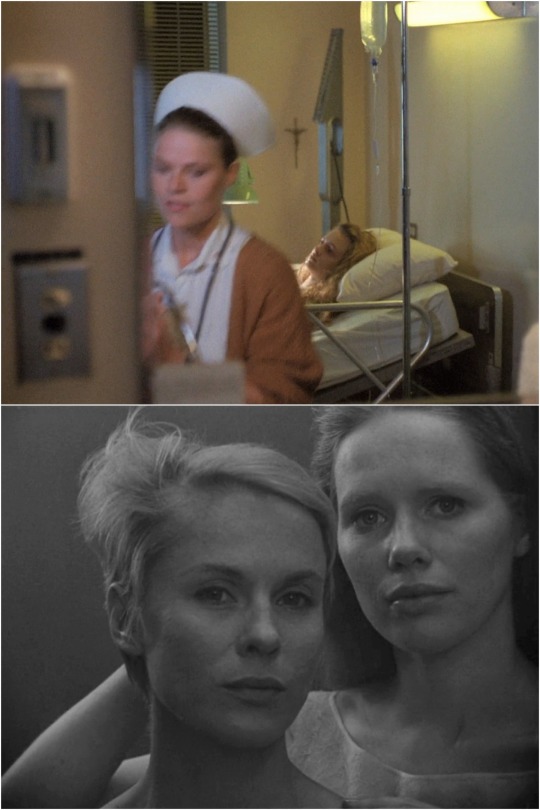
Two, we see Annie and the nurse reflected together in a mirror, just as in PERSONA we see Alma and Elisabet together in a mirror, in one of the most iconic sequences of that film. Notice also in the TP:TMP image above that there is a crucifix conspicuously hanging over Annie.

This crucifix brings out a third parallel, its Christian iconography echoing the Christ-like elements of PERSONA's symbolism, from that film's repeated imagery of a nail driven through a hand, to its moment of blood-drinking, to its mention of eternal life, & more...
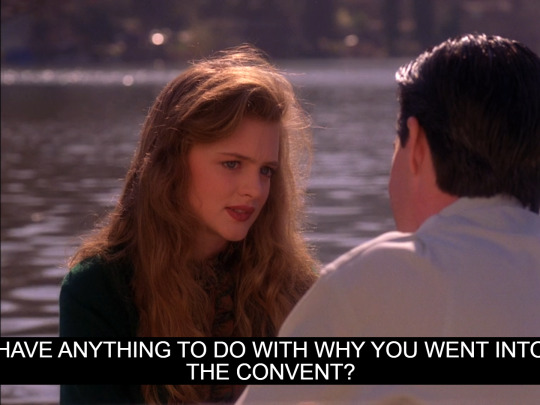

The distinctive nursing caps/uniforms worn in each film further draw out these Christian parallels by arguably evoking those of nuns' habits, a comparison underscored both in PERSONA by its nurse being referred to as "Sister Alma," & in TP by Annie's past life in a convent.
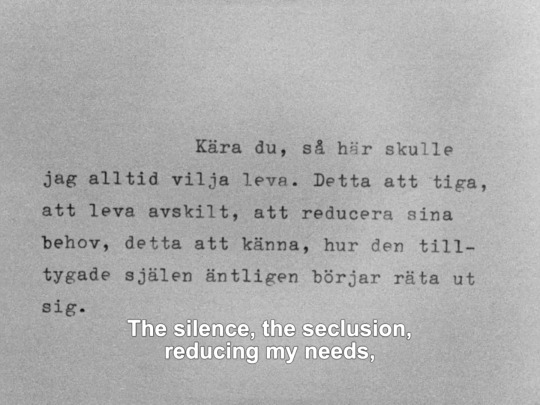
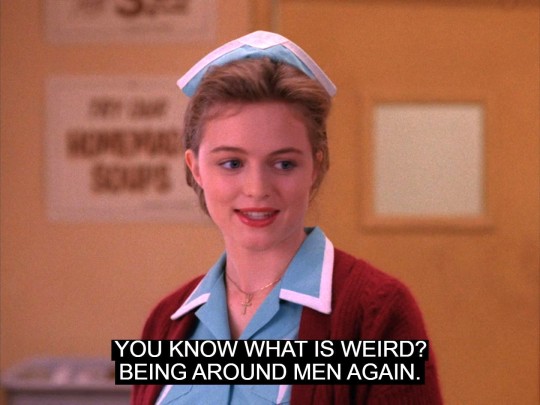

In addition to the world of religious symbols opened up by each work's implicit or explicit monastic references, the nun allusions also tie in themes of sisterhood, silence, and renunciation that are relevant to both works.

Indeed, Annie's situation at the end of MISSING PIECES seems to intentionally be suggestive of a type of return to this monastic state of silence, seclusion, and an absence of men, one steeped in Christian symbolism.

While neither Lynch nor Frost are practicing Christians (both seem more drawn to Dharmic religions), Annie's Christian faith is strongly emphasized in the series, carrying on a streak in TP's symbolism stretching back to MIKE's "face of God" soliloquy & forward to FWWM's angels.

While the Nurse-Annie scenes in TP:TMP may arguably be viewed as somehow less important to TP canon, given that they were originally deleted, it's important to note the very strong ways that scene parallels Laura's critical, Annie-featuring dream sequence in FWWM:

Consider the ways the Nurse-Annie scene mirrors the Laura-Annie scene. In each: 1). Annie recites the same statement. 2). The jade ring is then passed on to a new person 3). The ring-bearer then sees a reflection, looking back over their right shoulder into a room with a bed
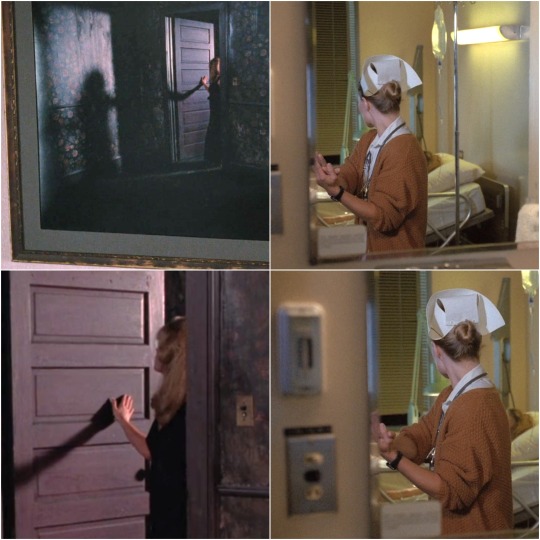
Indeed, as regards the "mirroring" moment, the construction is remarkably similar: we see a rectangular frame with a ring-bearing blonde looking over her right shoulder into a room with a bed. In the case of Laura, her outstretched right hand touches her shadow's hand; in the case of the nurse, her outstretched right hand (as seen in the mirror image) touches her left hand.

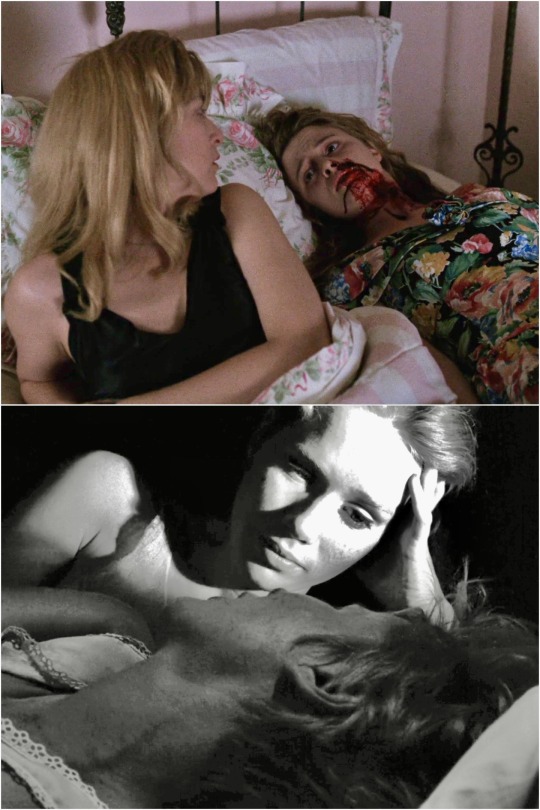
(Like the Annie-Nurse scene in TP:TMP, the Annie-Laura scene in FWWM arguably evokes moments of PERSONA as well, albeit here the parallels are more tenuous...)

(It's also perhaps worth noting a connection between Laura & a nurse made in the pilot episode, where a nurse stuffed-animal (a sockpuppet monkey?) can be seen in her bedroom.)
Other minor observations:

-In one of the few other notable elements of mise en scène in the TP:TMP scene, a painting of a lake in a forest can be seen behind the Nurse as she stares down at the ring (just before looking in the mirror), arguably evoking another iconic PERSONA image
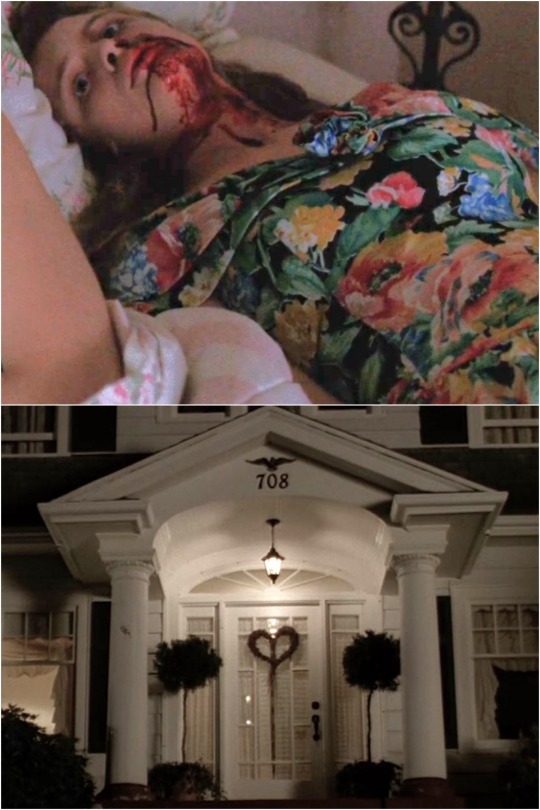
-The design on Laura's lamp post seen in several shots of Annie distinctly resembles a divided heart (much like the wreath on the Palmer House door, both suggesting Laura's "divided heart" necklace).
-Note also the 3D "flower" scrunch-flourish on Annie's dress evoking a blue rose.
Much more could be said about all of the topics herein, including especially the links between PERSONA & TP/Lynch generally, as well as the links between the Annie-Laura scene and the Annie-Nurse scene, each of which is deceptively deep.
To end, here's a 2018 quote from Lynch on what motivated his choice to return to TWIN PEAKS: “For a long time, no itch. But at the same time, there’s a thing in FWWM where Laura is in her bed and she's visited by Annie. Annie says, ‘I’m in the Black Lodge with the good Dale. Write that in your diary’. That little bit right there held a string of dreams"

20 notes
·
View notes
Text
white alt enbys love to smoke weed and then be like ive had an epiphany that's brand new and never before heard of that will give my life a beautiful and true sense of purpose after escaping my oppressive christian life and it's going to blow your minds... (insert belief natives have had for literally centuries). im also going to buy tiny buddha statues from urban outfitters to match my crystal necklaces that go along with my pagan identity
37 notes
·
View notes
Note
Ok I’m doing a rewatch and I noticed that when Kelvin is getting off the plane besides a cross he’s wearing an anchor pendant which is an odd choice for a flight (some might even consider wearing a symbol associated with water while in a plane to be a bad omen) however it also does symbolize stability and grounded lines which, compared, to his siblings he definitely is. Like Jesse and Judy are going to split that million dollars and Kelvin didn’t ask for a share. The pendant that Jesse wears often is a cross within a shield just as Jesse (as well as other characters) uses Christianity as a defense for his actions/wealth.
huh! i never noticed the anchor necklace but that's interesting. considering most of kelvin's accessories are religious-themed or otherwise basic, it makes the anchor choice stand out. i like the stability read, especially because in early season one he is presented as the sibling with the strongest moral compass and is the most pious member of the family.
in s1 kelvin also wears a necklace that looks like the silver outline of a half heart filled in with black that i can't identify. for all i know, it may be a common religious symbol, but i've never seen it before! any ideas?
the cross inside the shield necklace!! i believe the origin of that design is a reference to a bible scripture that says "the lord is my strength and my shield," but now i'm stoked because kelvin and keefe both wear the cross inside the shield necklace quite a bit in season two (and, please correct me if i'm wrong, but i think they only wear them in season two). in fact, they're wearing identical shield/cross necklaces during the provocative scene when keefe drops to his knees to dress an otherwise naked kelvin 😳... perhaps, in line with your interpretation for jesse wearing that necklace, kelvin and keefe are using christianity as a shield against giving in to temptation with each other.
(btw omg thank you for sending your thoughts my way! this is so fun, and i love thinking about the littlest details like this and contemplating the choices that were made in the creation of the show 🥺)

19 notes
·
View notes
Text
Oof Zionists are losing it



I love this person. I absolutely love how this person assumes that people who are protesting, who are continuously speaking up on the matter, who refuse to give a single courteous thought to the state of Israel must be all teenagers. Idk but there is this subtle flavouring of ageism- as if this young a person has nothing better to do and has no idea about what they are saying and is just chronically online screaming about things. ( 17 year old Palestinians are reporting from Gaza and documenting genocide btw).
Notice the insertion of the adjective "queer"...this is perhaps a reference to homophobia in Palestinian society ( because this is the only society where homophobia exists-there is certainly no homophobia in Israel, that immediately mocked queer people who were marching for Palestine, when it saw that queer identity couldn't be leveraged to gain a public approval for genocide)
Look how this Zionist points to Christmas-to Christianity-as if among white evangelical Christians of united states of america aren't the biggest Zionists and contributors in this genocide. There is this refusal to confront that cultures from around the world, who know oppression- people who are born to religions not limited to Abrahamic ones are protesting this genocide.
Once again there is this mockery made of sexuality- sexting Mahmud. You know in India, there is a trend under Hindutva rule, where women, especially Hindu women, who speak up about the rot of Islamophobia in the country, are told by Hindutvadis that they have fallen into the trap of love jihad ( "a trap" set by scary Muslim men for "innocent Hindu women" to lead them away from their religion). They mock women with "mera abdul ayega" ( my Abdul will come ) and I get the same whiff flavouring here as well. The way the sexuality of not only the aforementioned imagined queer person is perverted in between the lines but "Mahmud", the imagined Hamas "terrorist's" sexuality is demonized.
They continuously talk of October 7 and how the violence of October 7 is not acknowledged and how every lie that Israel has been caught in, doesn't matter because the debunking came from "unverified sources". I wonder if verified sources are the IOF- the military unit whose participants propose to their girlfriends in front of a bombed Palestinian school, whose participants loot necklaces belonging to a dead Palestinian brides, whose participants graffiti their wedding date on the walls of the home of Palestinians they have just murdered. Or if it comes from Iaraeli ministers who have previously screamed that it is their right to be racist against brown and black people. That said I am pretty sure popular pro Palestinian voices have said that they are very aware of the violence of October 7. But I guess Zionists don't want to hear that and acknowledge that this violence is the result of settler colonialism.
11 notes
·
View notes
Text
Short version: racists, stop co-opting religious symbols, because now I can't tell who's just religious and who's using those symbol to declare their racism.
Long version (under the cut):
Something happened to me in the late 2000s where I stopped seeing crosses as a source of comfort. Like, I have one in my bedroom, but I mean seeing crosses on other people, like on necklaces and things. As a kid, seeing them made me feel safe, to a degree, because I automatically "knew" that I had something in common with the people wearing them.
And then I started listening to the kinds of things that most of those people said, and all of the comfort bled away.
I'm still Christian, but I never see a cross anymore and think, "Oh, that person believes the same things I do!" More often, they believe the exact opposite. I generally hate to be an idealism purist, same as claiming to know everything and have all of the answers, but I DO know that Christianity has rarely been what Jesus wanted, and never when it was the predominant religion of the ruling class. Even though what these people practice clearly ISN'T Christianity, though, the religion itself and its symbols mostly make me feel uncomfortable now.
Well, I'm starting to feel the same way with Stars of David. And I DETEST that. Because, just like with my religion, I KNOW that Judaism is NOT what Zionists and evangelical hate groups are trying to make it into. I know that more Jewish people than not oppose the genocide in Palestine because they've been victims of countless genocides themselves and know that "never again" means for everyone, not just Jews. I know that Judaism is not a religion or ethnicity built on hate. But, just like I know the same about Christianity while evangelicals and fundamentalists clearly don't, I know this about Judaism while Zionists don't. I can't even say there's a significant difference between the two, because, at least in America, nationalism has tainted both to the degree that most public figures of both Christianity and Judaism are the loudest supporters of Israel. And now I'm wary every time I see a Star of David in someone's profile picture, because I don't know if it's from a Jewish person who's rightfully proud of their heritage and/or religion, a Jewish person loudly reaffirming their faith by asserting that their beliefs don't condone genocide, or a Zionist who co-opted the symbol for their hate crimes or support of them.
I hate it.
I mean, what next? Am I going to start feeling uncomfortable when I see the aum? The crescent? The yin yang symbol? Which group is going to take a religion -- an inherently neutral thing -- next and turn it into something vile that makes me question the morals of everyone associated with it?
I don't hate religions. I love the ways that people have faith and express it. I love the different ways that so many human beings see God or the divine. Religion is not the enemy because, to paraphrase David Mitchell, people have killed each other in the name of anything, whether it was politics or religion or something else, since the dawn of time. Removing religion just removes the comfort and sense of identity that a lot of people cling to in their darkest moments. But the more that wicked people appropriate symbols of faith, the harder it is trust that any religious person believes what they say instead of using their beliefs as a justification for cruelty. Especially since the people who are loudest about belonging to a specific religion are usually the ones doing the most harm.
And in case it wasn't clear (and because reading comprehension on this site is notoriously poor), this is NOT a place for antisemitism. Get out of here with that bullshit. Jewish people are just as much people as everyone else and have just as much of a right to their faith and ethnicity. Zionists, however, are scum who typically hide behind either Judaism or fundamentalist Christianity as an excuse to kill innocent people and colonize land that doesn't belong to them.
4 notes
·
View notes
Text
my kid, 10, has been raised thus far without religion. as best as we can, at least, living in Utah and her having two sets of solidly LDS step-grandparents (both parents have remarried to ex-mo's). she knows *of* religion, of course, but not a lot of specifics.
while we were riding the train home on Friday night, she mentioned something about not understanding why Christians put crosses on everything. I asked her if she'd really like to know, because it's kind of a grisly story. She, being ten and super into fantasy violence right now, said YES without hesitation.
so I told her about ancient execution methods in Roman-occupied Palestine and about Constantine's "conquer under this sign" dream and about Christian Rome's attempts to de-paganify everyone they came into contact with thereafter. this of course involved some reference to a certain gentleman from Nazareth that was crucified. we talked a little bit about what Jesus taught about, the arguments about if he was real or not, and even mentioned some miracles he was said to have performed and how that might have made people feel who were nearby at the time.
again though, I'm an ex-Christian and my daughter is not and has never been religious. this was instructional conversation about Christianity from an outsider to an outsider. not induction into Christianity, just "this is the beliefs of this culture that surrounds us and we cannot escape from, it is good to know some of it so you will recognize it when you see it".
while we were bringing the conversation around again to my daughters first question (crosses, the execution of Jesus, why to Christians put it on everything) we pulled into a station. A child who had been sitting somewhat nearby walked past us to the door and turned to say "GOD BLESS YOU" extremely loudly, followed by his mother, who also stopped, touched my shoulder, and said "thank you for teaching her! keep the faith alive!"
my daughter and I turned back to each other with identical looks of confusion then laughed - these people had clearly just heard me talking about Jesus and had missed the entire actual content of the conversation. also we are both VERY VISIBLY queer and I was wearing an inverted pentagram necklace (outside my shirt, for once).
it was extraordinarily strange.
this story doesn't have a point, except I suppose that if you're going to eavesdrop, at least do a good job.
17 notes
·
View notes
Note
legit question as someone raised christian: why is the jesus pendant appropriative of Jewish design/iconography? the mezuzah I understand of course but I'm confused about the second one. thanks for your time!
it’s bc it’s made in the shape of a magen david/jewish star! like the fact that it’s a necklace that says jesus is whatever it’s bc it’s a symbol associated specifically with jews and jewish identity but they’ve (to borrow the terminology used by the author of the article) “grafted in” the word “jesus”.
the mezuzah is objectively worse though bc a mezuzah is actually a ritual object, and also that one has a menorah on it along with the christian fish and the menorah is a much older jewish symbol than the star.
so yeah tldr it’s just kind of scummy and weird bc the magen david has been used by jews as a symbol of our religious and cultural identity for centuries so making it say jesus is. weird.
7 notes
·
View notes
Note
This is the self insert/OC fairy. 🌼🧚♀️When you get this in your ask box, please tell us 3 facts about your S/I or OC and pass it around. Let's learn about each other's S/Is/OCs! 🌈🌷 (for Reese Diana Jaeger if that's okay? 👉👈 😗)
Thank you! And of course, it's been so long since I talked about my girl, Reese ❤️
Reese is religious. Her mother was a devout Christian and passed that on to her before she died of cancer pre-Collapse. The silver cross necklace Reese always has on belonged to her mother and she keeps that as a memento of both her and their faith.
Reese's beliefs also are what forges an initial bond between she and Joseph, and makes her more willing to throw caution aside and listen to him at first meeting
Reese is the youngest of 5. She has 4 older brothers who were all instrumental to her upbringing and shaping her personality and beliefs, especially post-Collapse when they all entered into a paramilitary organization set on keeping order and stability in the years that followed.
Reese's oldest brother, Danny, is almost more her father figure, as their actual dad wilted following their mother's death and he stepped into her paternal role even before the bombs dropped. She is closest with him and wants his approval and acceptance most, even in spite of their differing views on the world and the people in it as she grows into an adult post-Collapse
Reese has a tattoo on her left bicep, an identical one shared with each of her 4 brothers. It's a howling wolf above a five-point star with the Latin words "lupus non timet canem latrantem" under them, meaning "a wolf is not afraid of a barking dog".
The wolf is for the Jaeger family and the "pack" they view themselves as, and each point of the star is for one of the siblings. The phrase itself is for how they don't back down and are not intimidated by those around them.
6 notes
·
View notes
Text
Ghostbusters + Hanukkah Moodboards: Erin

Jewish Erin headcanons:
- A Jewish Erin converted to Judaism as an adult. Born into a secular-ish family who celebrated the Christian holidays, Erin noticed the sharp contrast between how her parents were cold and emotionally distant from her, but Abby’s family was exuberant, openly accepting, and full of love and warmth to share. As a teen and young adult, she attended celebrations of Jewish holidays including Hanukkah with Abby’s family and fell in love with the religion and the sense of community she felt among Jewish people. She followed through on the conversion process after she and Abby reconnected in their 40s and is probably one of the more observant Jews among the Ghostbusters for this reason.
- Erin very deliberately surrounds herself with warmth and light during Hanukkah. Her celebration style is classy, traditional, and warm, featuring lots of gold. Her Midwestern background and joy in the Jewish identity she chose motivates her to put a lot of effort into elaborately decorating for Hanukkah and hosting celebrations, every decoration perfectly coordinated, every gift perfectly wrapped.
- She’s an artist, specifically a painter, and she often finds herself feeling especially inspired during the holidays.
- Erin is not a very good cook, but she loves baking and making bread, and she is absurdly good at making challah, something Abby’s family taught her how to do as a young adult. Abby never had any particular interest in cooking or baking, but Erin was enthralled to learn and happy to be included.
- She was gifted a gold Star of David necklace by Abby’s grandmother upon completing her conversion process. She only wears it on special occasions, but the delicate gold star, like her treasured seashell and anchor necklace, is nonetheless one of her most important possessions.
(2/5, all of these can be found at: https://archiveofourown.org/works/43686742/. For @aimmyarrowshigh's Hanukkah Bingo, check it out!)
21 notes
·
View notes
Text
headcanon that gwen's mom is jewish and she was raises with the religion, so instead of wearing crosses and having catholic or christian accessories that a lot of goths do, she wears a star of david necklace and makes a lot of her own jewelry to better fit her identity.
#total drama#gwen#gwen td#td gwen#td headcanons#idk her mom just seems jewish and i can see gwen being jewish too#i headcanon her as white jewish and japananese mixed so i can see her having a lot more styles than just christian inspired goth that a lot#of people give her in redesigns and fanart#its really cute though but this is just my idea elle oh elle#gwen tsuiji#aloeverants
45 notes
·
View notes